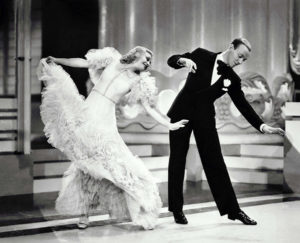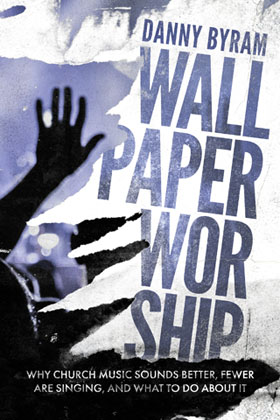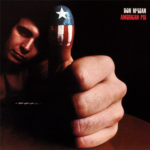
If you’re thinking “Oh brother! Here we go…another legalistic churchy rule,” stay with me. It’s not. Let’s level the field: if you’re using pop songs in worship, I do not universally condemn it.
When I was on a large church staff with a wide talent pool, I used to perform pop songs periodically and really enjoyed it. It was a thrill to connect a lyrical parallel in a popular song with a sermon and to make the song sound like the recording performed live.
IT CAN WORK
One of my most effective experiences was when our pastor gave a sermon on “God wants you to join Him in His dance.” He used a clip from the Tom Hanks’ 1999 prison movie The Green Mile, in which the condemned prisoner, who happens to be innocent, has eaten his last meal before being executed and is watching his last movie, a 1930s classic with Fred Astaire and Ginger Rogers (For Those of You With No Connection to the Past, acronym FTYWNCP, Fred & Ginger were an acting/dance team that killed it in the ballroom style). The song they danced to, in the scene the prisoner watches, is “Dancing Cheek To Cheek.” (FTYWNCP, check it out on YouTube.) Watching Fred and Ginger, the prisoner says in tears, “This must be heaven. They look like angels…”
Our church’s tradition was to end each sermon with communion while the band played as people went through the line for the elements. For communion music that day we played “Dancing Cheek To Cheek.” People were in tears as they connected the sermon with communion through the song. God was inviting them to “dance with Him” and they did.

SO, IS THERE A PROBLEM?
Consider: We, in the worship music industry, have become so good at live performance (the American church spends $2 billion/year of its budgets on music/theatrical production gear) that often we perform pop songs “just because we know how.” Someone shared with me about a Nirvana song that opened a service at a megachurch. I asked, “Was it related to the sermon or service theme?” “Not that I saw or heard,” he responded. “It was just really cool.”
I have heard and seen performances in worship services of songs by Aerosmith, Justin Timberlake, Beyonce and others that are done – a) because the band knows how to and wanted to – b) to invite the unbeliever into an atmosphere that is familiar and non-threatening.
Do we really play to so many un-believers in our local worship service that we feel setting the atmosphere at their level of understanding achieves a worthy goal? If the purpose is to win them to the Gospel, is it working?
Gallup Research conducted a study of churches county by county in the USA, to find out what large and small churches spend ($) to pull off weekend worship services, and the result thereof. The study took into account building/venue costs, salaries of those who are required to execute the weekend productions (pastors, associates, musicians, crew, teachers), printed materials given away, licensing fees for use of song copyrights (CCLI), coffee bars and other related expenses. Add the $2B/year of gear purchased from production retailers. Divide those numbers by how many individuals the churches report who make life-changing commitments to the Gospel as a result of the weekend productions. Gallup’s results are that it costs the church over $1 million to convert one non-believer. If we presented this financial idea on TVs Shark Tank, the investors would pass.

THE IDEA HERE IS NOT TO SHAME US, BUT TO AWAKEN US.
Jesus’ words can guide us as we make decisions on how to musically shepherd our “audience” (aka Jesus’ sheep): “I know my sheep and they know me and hear my voice, just as my Father knows me and I know the Father. My sheep will not listen to a hired hand. A hired hand will abandon the sheep because they don’t belong to him; he runs away because he’s working only for the money and doesn’t really care about the sheep.” John 10
Why spend our time in service-planning and rehearsals to perform a song that has nothing to do with a sermon or a scriptural theme – because we want to be approved of by people who don’t know the Savior we are trying to “sell” them? What about the sheep of the Shepherd, our congregants – who come to weekend services for spiritual renewal, refreshment and teaching of the word of God? Do unrelatable pop songs – which they hear every day anyway – help meet their needs?
Francis Chan, in his book Letters To The Church said: “People are either awed by the sacred or they are not. We (leaders) have addicted our people to less.”
I quit using pop songs simply because my time leading His sheep is limited, both in the allotted weekend time and in how many weekends I have left on this planet. I choose to play to the sheep and their needs. Non-believers are welcome to come along as the Holy Spirit draws them.
I welcome your comments below. What’s your experience?








great comments man…and it is because of reading Wallpaper Worship…I became convicted of the pop overload..and am now standing w my wife when the scripture is read before the sermon preached out of Reverence 4 the Book and the History behind that setting in our congregations
Gerald, thanks for your comment. Standing during scriptures is a great act of worship. Blessings.
I as a worship leader would not use pop music in a service. I think the church has done a diservice by bringing the world’d music, entertainment and style into the church. We’ve lost teaching doctrine through songs wth great messages. We’ve failed to teach Scripture through music by always trying to appeal to a generation who is drawn to just the sound of a song. We’ve stopped teaching the message. The Gospel is poweful in itself yet we feel like if it doesn’t appeal to someone then we are to cater to their particular worldly desire.
Christian songs that have stood the time test have depth to them. In dealing with young people’s choices of songs it is usually based on a fleshly appeal. They say I like the beat. They can’t tell you the message but it appeals to their flesh. I want to use songs that help our congregation focus on the Lord and His attributes. Do our songs call us to live separated, godly lives? Do they draw the choir to worship even as they are rehearsing.
It’s a constant challenge but our music should help prepare hearts for the sermon.
Sherri – Thanks for your comments and your thoughts. Helping our congregants focus on the Lord and His attributes is a great statement. Let’s strive to never loose doctrine through our teaching, our programs, and especially our music, no matter whether we are traditional, liturgical or contemporary. Blessings to you!
In my church, we sing hymns from the hymnal. I plan this because it only takes a single generation to cease using hymns and they are gone. The text of a hymn communicates enduring truths of our faith. Pop culture songs evoke emotion and connection, which is predominantly a human connection rather than a theological truth. There may be a place for pop songs in worship if the pastor / worship leader intends to show contrast what culture would sing about, against what mature disciples teach us through their music and message. Good liturgy is timeless.
People come to church to find God, whether they already know Him or not (yet). For this reason, as well as the limited time factor you mentioned, I can’t imagine using secular music regularly in worship services.
However, I love many varieties of secular music, and am often moved to worship by a great performance of any type of song. Music is a gift from God, and He is certainly able to use it for His purposes. A well-placed secular song could be a great addition to a worship set.
Let us be led, in reverence and awe, by the Holy Spirit.
As always, great food for thought, Danny!
Thank you Mollie. Let’s be awed by the sacred – no matter how it is presented.
Great discussion Danny. Reminds me of the question, “What business are we in? and How’s business?”
The Holy Spirit is not a brand.
True. The question now is “when will the Holy Spirit be tired of being made a brand, and will break the mold?” Is the church ready?